MercoPress. South Atlantic News Agency
Tag: wool
-
Tuesday, January 27th 2026 - 04:43 UTC
Falklands Agriculture: mainly wool, exceptionally clean and white
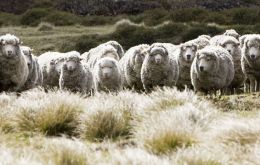
Much of the Falkland Islands’ land mass is used for agriculture. The main product is wool, with an EU approved abattoir producing mutton and lamb for local and export markets and beef for local markets.
Add your comment! -
Thursday, October 2nd 2025 - 09:00 UTC
Uruguay's wool sector is going through a boom
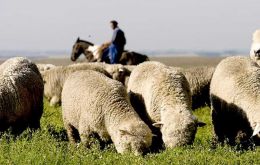
Despite a long-term decline in flock size, Uruguay's wool and sheep sector is going through a boom driven by record-high international prices. Wool prices have reached their highest level in at least three years in the South American country, mirroring a dramatic surge in the Australian market.
-
Tuesday, August 19th 2025 - 20:17 UTC
Falkland Islands to host first-ever international shearing tri-nations test match

The Falkland Islands will host their first international shearing and wool handling test match on 14 November 2025, featuring teams from Wales, Chile, and the Falkland Islands. The landmark event, organized by Falkland Shears in partnership with the Falkland Islands Development Corporation (FIDC), will take place at the Falkland Islands Defence Force hall in Stanley.
-
Friday, July 5th 2024 - 06:43 UTC
Brazil has opened its market for Australian mutton and lamb

Despite Mercosur partners with significant flocks, Brazil has reopened its market for Australian mutton and lambt, including sheep meat by-products and edible offal, the Australian Ministry of Agriculture, Fisheries and Forestry announced this week.
-
Saturday, October 28th 2023 - 10:26 UTC
BFSAI help with soil erosion and pasture re growth in the Falklands by spreading wool
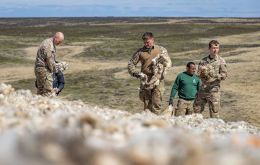
Members of British Forces South Atlantic Islands, BFSAI, are helping to combat soil erosion and re-growth of pastures in the Falkland Islands.
-
Wednesday, August 16th 2023 - 10:55 UTC
Uruguayan minister tells sheep farmers they must target finer wool

“We are facing the worst crisis in sheep farming,” said Uruguayan Agriculture Minister Fernando Mattos, who added that the situation is not limited to Uruguay but to all world farmers who produce cross bred wool with a 24 to 26 microns fiber. “The new reality are finer wools and we must face it”.
-
Friday, June 9th 2023 - 19:36 UTC
Only 40% of Falklands wool clip, mainly finer wool, has been sold
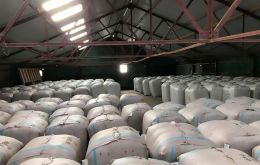
Falklands Landholdings General Manager John Ferguson confirmed 835 bales have been sold so far from this year’s FLH wool clip but there are still 1,800 bales of wool left to sell.
-
Tuesday, July 20th 2021 - 09:25 UTC
Patagonia lawmakers call for an end to export duties on fisheries produce, fruit, lamb and wool

Argentina lawmaker from the province of Chubut, Gustavo Menna has called on the central government to eliminate export duties on fishery products, fruits, ovine meat and wool. The initiative was also drafted by lawmakers Lorena Matzen and Roxana Reyes from the provinces of Rio Negro and Santa Cruz.
-
Thursday, February 25th 2021 - 09:05 UTC
Lost sheep found in Australia delivered more than 35 kilograms of wool

Imagine a stray sheep yielding a fleece weighing more than 35 kilograms: it happened in Australia where Baarack was found by rescuers and was shorn for the first time in who knows how many years.
-
Thursday, April 23rd 2020 - 08:59 UTC
Falklands' government will buy unsold wool clip in support of producers
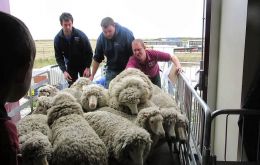
The Falkland Islands government announced on Wednesday a support program for wool producers and their unsold clip in light of the COVID-19 pandemic. For that purpose, it has authorized the Department of Natural Resources to develop a program to purchase the unsold wool, in a one-time offer, with the price set at March 20.
